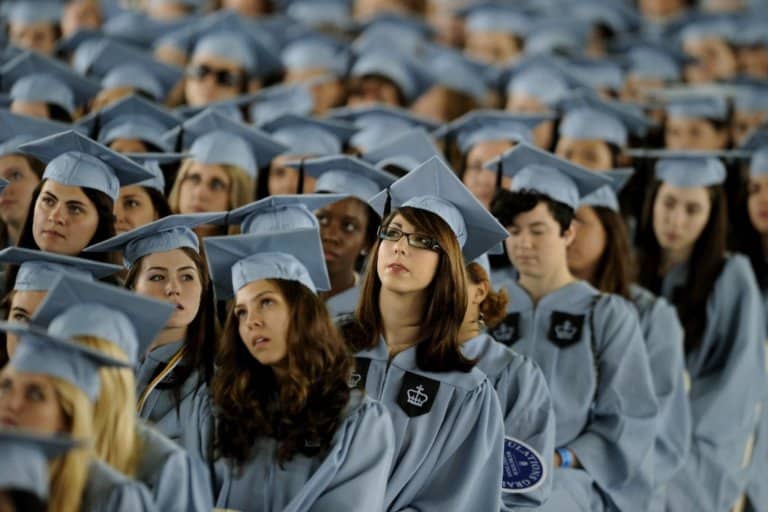
Harvard University, University of Oxford, Massachusetts Institute of Technology (MIT) and the University of Cambridge.
We have all heard of these world-class universities; a dream for many international students looking to study abroad.
However, while these universities are some of the best in the world, they are also some of the hardest universities to get into.
While you need excellent grades to get in, to be accepted at one of these universities, you will be judged on much more than your academics.
If you are up for the challenge, check out the hardest universities to get into in the UK, US, Australia, Canada and New Zealand.
Hardest universities to get into in the UK:
1. University of Oxford
As the best university in the UK, it is no surprise that the University of Oxford has the highest entry standards among all institutions in the country.
The university is extremely selective with admissions, with a low acceptance rate of one in six for undergraduates, according to AdmissionReport.
One of the university’s most competitive programmes is the BA/MMath Mathematics and Statistics, which only has a 3.5% acceptance rate. On the other hand, the BA Modern Languages programme is one of the least competitive ones, with an acceptance rate of 55% — a coin flip, really.
The math programme will require you to have the A-level grades of A*A*A with the A*s in Maths and Further Maths if taken. You will also need to take the university’s Mathematics Admissions Test — a two hour and 30 minute-long test. In 2024, the test consisted of 27 questions, 25 of which were multiple-choice and two longer questions for which candidates will type responses.
Meanwhile, the BA Modern Languages programme calls for the A-level grades of AAA, as well as one or more modern languages, depending on course choice. You need to undergo the Modern Languages Admissions Test, which comprises 10 sections. Each language section consists of 20 multiple-choice questions and 10 English translation questions. Two to three pieces of written work must also be submitted upon application.
Learn more about admissions to Oxford here. For those who are using international qualifications, click here.
View this post on Instagram
2. University of Cambridge
As expected, another must-mention on the list of hardest universities to get into in the UK is the University of Cambridge.
Renowned as one of the world’s oldest universities and leading academic institutions, Cambridge has high standards for its applicants. This is no surprise for a university that has produced 90 Nobel Prize winners.
According to AdmissionsReport, the undergraduate acceptance rate is one in five for the 2023-2024 academic year.
Here, the university’s most competitive undergraduate programme is the BA Computer Science, with only a 9.3% acceptance rate. Comparatively, the BA Modern and Medieval Languages is the least competitive, with 61% of applicants accepted for their studies.
The minimum requirement to enrol in the computer science programme are either A-level grades of A*A*A or International Baccalaureate (IB) results of 41-42 points, with 776 at Higher Level. You will need to have taken Mathematics and Further Mathematics.
Cambridge notes that 87% of successful computer science applicants achieved at least A*A*A*, took Mathematics as a subject, and over 97% took Further Mathematics too.
For the modern and medieval language programme, you’ll need the A-level grades of A*AA or IB results of 41-42 points, with 776 at Higher Level. 71% of successful applicants to the programme in 2023 achieved at least A*A*A, and 60% bolstered their chances of enrolment by taking two languages for their exams.
Learn more about admissions to Cambridge here. For those who are using international qualifications, click here.

Barack Obama is one of the many successful people to graduate from Harvard University. Source: AFP
Hardest universities to get into in the US:
1. Stanford University
Standford University has been recognised as the hardest university in the US to get into for several years now.
As one of the best universities in the US and the alma mater of more than 20 Nobel Laureates, 17 astronauts, and 30 billionaires, it is no surprise that getting into Stanford is difficult.
The acceptance rate for the international undergraduate class of 2024 was 5.1%. The class of 2025 and 2026 dropped to 3.9% and 3.6%, respectively, though the class of 2027 saw it return to 3.9%.
The most popular programme conferred at Stanford is computer science. In the 2023-2024 academic year, the university granted 341 bachelor’s in computer science degrees, followed by 133 bachelor’s in human biology in the period.
Beginning with the 2025–2026 application cycle, Stanford will reinstate its standardised testing requirement halted during the pandemic. ACT or SAT scores will be required for first-year and transfer students submitting Fall 2026 entry term applications.
The university states on its applicant page that “there are no minimum test scores required to be admitted to Stanford, and there is no score that guarantees admission.” It continues by saying that they review applications holistically, meaning every application component is valuable to us as they get to know each student.
View this post on Instagram
2. Harvard University
No surprises here. Getting into Harvard is hard.
For the class of 2028, Harvard received 54,008 applicants and only admitted 1,970 — approximately just 3.65%. 18% of that number are international students.
The most intended field of study for that cohort is the social sciences, where 37% will pursue their studies.
Harvard accepts the SAT or ACT to meet the standardised testing requirement. Other methods to apply include using your AP exam results, IB Actual or Predicted Scores, GCSE/A-Level Actual or Predicted Results, or National Leaving Exams Results or Predictions.
One important thing to note is that the university doesn’t just look at academics during admission. Instead, Harvard assesses each student as a whole, considering their character and academic potential. Here, admissions officers rely heavily on letters of recommendation, college interviews, and extracurriculars to identify outstanding students.

Former Justice of the High Court of Australia, Michael Kirby, earned his law degree from the University of Sydney. Source: AFP
Hardest universities to get into in Australia:
1. University of Sydney
The University of Sydney was established over 200 years ago and has since produced five Nobel Laureates and eight Australian Prime Ministers.
However, getting into the University of Sydney is no walk in the park. Less than one in three applicants get accepted.
The university’s best-ranked disciplines are subjects in the arts and humanities, according to the Times Higher Education (THE) World University Rankings by Subject 2025. Surprisingly, to enrol in the Bachelor of Arts programme here for the 2025 academic year, you’ll only need 26 on your IB Diploma or equivalent. You’ll need to prove your English proficiency, though, which will require a minimum score of 6.5 overall and a minimum of 6.0 in each band.
For those who are using international qualifications to apply, click here.
View this post on Instagram
2. University of New South Wales
The University of New South Wales ranks #19 globally on the QS World University Rankings 2025, and is the #3 best university in Australia.
EduRank reports that the university has a 60% acceptance rate, based on the ratio of admissions to applications and other circumstantial enrollment data.
Here, the Bachelor of Actuarial Studies is believed to be one of the most competitive business programmes in Australia and is the flagship entrance for the highest-achieving business students to enrol in.
Admissions-wise, the lowest Australian Tertiary Admission Rank (ATAR), which is a number between 0.00 and 99.95 that indicates a student’s position relative to all the students in their age, was 98.0 in 2024. Alternatively, you’ll want at least a 41 on your IB Diploma results to join the programme in 2024.

Canadian Prime Minister Justin Trudeau gives a thumbs up as he arrives for New York University’s commencement ceremony at Yankee Stadium. Source: AFP
Hardest universities to get into in Canada:
1. McMaster University
McMaster University has one of the most stringent admission requirements compared to other institutions in Canada.
It is one of the most prestigious universities in the country, placing fourth in the nation and ranking #116 in THE World University Rankings 2025.
EduRank estimates that the acceptance rate here is 54%, based on admission statistics of closely ranked nearby universities with similar research profiles as the university does not provide the specific data themselves.
Common international admissions requirements include:
- IB: Six subjects – three at Higher Level and three at Standard Level plus the theory of knowledge and extended essay. However, the minimum score required for consideration varies by programme.
- A-level: A minimum of five subjects — three distinct GCE Advanced Level(A2)/International A-level subjects and two GCSE/IGCSE/ O-level subjects. The specific Advanced Level (A2)/International A-level subjects required for your chosen programme.
2. University of Ottawa
The University of Ottawa is the largest bilingual university in Canada, ranks within the top 200 in the QS World University Rankings 2025, and is also one of the hardest universities to gain entry to.
Like McMaster, Ottawa does not release its admissions data. However, EduRank estimates the acceptance rate here to be 50% based on admission statistics of closely ranked nearby universities with similar research profiles.
The university ranks #4 in the country for political science and law and #6 for education, according to QS World University Rankings by Subject 2024.
While not much is known about the admission requisites for Ottawa, commenters on Reddit share that not only is getting admitted difficult, but staying in the university can be a challenge, too. “If your average falls below 65% at uOttawa, they will put you on probation and kick you out if the grades are still low,” one Redditor shares.

Outgoing New Zealand prime minister Jacinda Ardern gives her valedictory speech in parliament in Wellington. Source: AFP
Hardest universities to get into in New Zealand:
1. University of Auckland
While getting into a university in New Zealand is not that difficult, the University of Auckland can be a little tricky to get into. The best university in the country is ranked #65 on the QS World University Rankings 2025.
EduRank estimates the acceptance rate at the university to be 73%.
Below are a few of the guaranteed entry requirements for 2025 admission to specific undergraduate degree programmes for applicants with overseas secondary qualifications:
- Bachelor of Arts: 1150 SAT, or 7 AP
- Bachelor of Commerce: 1160 SAT, or 8 AP
- Bachelor of Science in Biomedical Science: 1300 SAT, or 12 AP
- Bachelor of Engineering: 1300 SAT including Mathematics (requires Calculus) and Physics, or 12 AP 12 including Mathematics (requires calculus) and Physics.
View this post on Instagram
2. University of Canterbury
With a history dating back over 150 years, 60 international partner universities, over 3,000 employer connections, and up to 75 senior international academics visiting each year, the University of Canterbury prepares you well to tackle the world after university.
The first challenge, however, is making it past admissions. Here, EduRank estimates the acceptance rate to be at 72%.
The entry requirements are as follows:
For those using the Cambridge International Examinations,
- A or AS level entrance requirement: A rank score of at least 120 points and a minimum grade of D in each of at least three subjects equivalent to those on the approved list (similar to NCEA approved subjects).
- Literacy requirement: a pass in any of AS English Language, English Language and Literature, English Literature or English General Paper.
- Numeracy requirement: either (i) a D grade or better in IGCSE or GCSE mathematics or (ii) any mathematics pass at AS level.
For those using their IB Diplomas, any mathematics subject at IB meets the numeracy requirement, and the literacy requirement for admission will be met if the IB diploma has been completed with English as the language in any of:
- Language A: literature (SL or HL)
- Language A: language and literature (SL or HL), or
- Language B: (HL)
For those who are using other international qualifications to apply, click here.
However, being an exceptional student doesn’t guarantee you admission into a prestigious university. This was the case for Hamza Alsamraee, who had a 4.2 GPA, SAT score of 1560 out of 1600, and is an author of two successful books and has a string of accolades.
Despite his impressive accomplishments, Alsamraee was put on the waitlist and even rejected from some top universities, including Harvard, MIT, Yale, and Princeton.
It begs the question, what do university admission officers look for?
Are grades and extracurriculars all that matter?
Getting accepted into a university depends on a number of factors.
Universities will consider your academic grades, extracurricular activities, and English proficiency scores.
But that’s not all admissions officers are looking for.
They’re also looking at your essays, your performance at interviews, and other factors that may be out of your control.
How much weight do college essays and admission interviews carry?
This may be shocking for many, but your college essay can account for up to 25% of your overall application.
This is not far behind your extracurriculars which account for 30% and is higher than the 20% that grades carry.
Universities use your college essay to get to know you and assess what you could bring to the school. So remember to take this opportunity to stand out by sharing your experiences and perspectives.
While admission interviews do not carry as much weight as your grades and extracurricular activities, it is still a factor that many universities take into consideration.
An admissions interview will allow universities to get to know you better as they ask you questions about your interests, goals and experiences.
Though not the sole deciding factor, how you perform during your interviews can help you stand out from other applicants.
This was the case for Dr. Harun Khan when he applied to study at Imperial College London and Harvard University. Excelling in these areas gave him two prestigious scholarships to pursue his studies.
Dr. Khan is one of only three to hold a Fulbright Award and a Kennedy Scholarship. Aside from submitting his transcripts, test scores, essays and references, he had to undergo an interview when shortlisted.
“The interviews took place in central London and were the most challenging aspect of the process. For example, the interview for the Kennedy Scholarship was led by the UK Chief Scientific Advisor for 2017, along with nine of his colleagues, all appointed by the UK government. This also included a representative from MIT and Harvard University. The interviews for both awards were broad and ranged from questions about my research to international affairs,” he shares.
But no matter how difficult, don’t let these factors stop you from applying.
Harvard and Standford graduate Andrew Loh says, “I challenge you to ask yourself: in 30 years, which would you regret more – (1) applying and perhaps not getting in, or (2) not applying? In (1), you’ve done everything in your power, whatever the outcome. In (2), you might wonder if these universities might have accepted you for the rest of your life.”
Disclaimer: This article was last updated on January 28, 2025.










